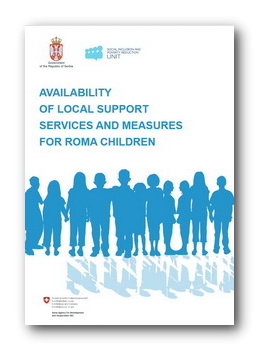 The Social Inclusion and Poverty Reduction Unit of the Government of the Republic of Serbia (SIPRU) has published the analysis Availability of Local Support Services and Measures for Roma Children. The analysis includes social, educational and health care services available to children under 18, as well as services/measures that prevent discrimination of Roma children.
The Social Inclusion and Poverty Reduction Unit of the Government of the Republic of Serbia (SIPRU) has published the analysis Availability of Local Support Services and Measures for Roma Children. The analysis includes social, educational and health care services available to children under 18, as well as services/measures that prevent discrimination of Roma children.
As one of the contributions to the monitoring of the implementation of the Roma Social Inclusion Strategy in the Republic of Serbia for the period 2016 – 2025, the Social Inclusion and Poverty Reduction Unit, in cooperation with the Council for the Rights of the Child of the Government of the Republic of Serbia, launched the preparation of this analysis, aiming to provide answers to the following key questions:
- Does the legislative and strategic framework in the Republic of Serbia provide a basis for improving the situation of Roma children?
- What are the prerequisites for meeting the local legislative and strategic priorities for improving the situation of Roma children?
- What are the key challenges and capacities in developing, implementing and monitoring local services and measures for Roma children?
The main findings and recommendations are based on:
- an analysis of the national and local regulations and policies;
- an analysis of the national and local strategic and institutional framework;
- an analysis of key findings of surveys and reports of relevant local and international institutions;
- the identification of challenges in the implementation, management and coordination of the support system at the local level.
Considering that a significant share of activities and services for children are provided by the civil society organisations (CSOs), SIPRU conducted an online survey of services/activities implemented by CSOs at the local community level; the characteristics of children participating in the activities; the capacities and challenges the CSOs are facing in their work.
Answers from 61 CSOs providing services for Roma children at the local level were collected and analysed. Most of the civil society organisations (more than 60%) that participated in this survey have many years of experience in working with children from the Roma community (more than 10 years of continuous work).
Based on the evaluation of the content of relevant national and local documents, and the survey conducted with the representatives of CSOs, recommendations were made for improving the availability of support measures for Roma children at the local level, in order to ensure the efficient implementation of national strategic commitments and improve the situation of Roma children in Serbia.
This analysis does not represent an exhaustive list of support systems for Roma children at the national and local level, the main goal was not to map all existing support measures, but to identify key factors that affect both the availability of services and monitoring of the effects of the implementation of support measures, primarily at the local level.
 Government of the Republic of Serbia
Government of the Republic of Serbia















 pdf [271 KB]
pdf [271 KB]
Leave a Comment